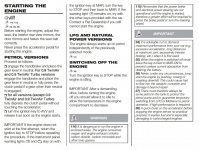WitleyPanda
Member
- Joined
- Nov 1, 2016
- Messages
- 322
- Points
- 138
Some general notes:-
The make-up of any transport grade gas, be it LPG or CNG may vary from country to country and source to source. So in the UK LPG is sold under the Autogas name and is propane, not propane/butane mix. CNG trends to be pure methane, but may have some propane to correct the calorific value.
CNG historically used for trucks/HGVs where Diesel engines have been re headed to reduce compression ratio and introduce spark ignition.
The fuel is cleaner and burns more complete, so the wear on the engine should be less. However most wear on engines occurs on cold start-up and typically LPG/CNG engines use petrol/gasoline to help or fully to start. If the engine has been fully designed for gas then, particularly in warmer climates, it may start without a dual fuel.
CNG/LPG engine should run with lower noise, so if the test drive vehicle noisy would compare it to a petrol equivalent, as to the baseline noise levels.
Lastly CO2 and Nox levels far lower, more environmental vehicle.
The make-up of any transport grade gas, be it LPG or CNG may vary from country to country and source to source. So in the UK LPG is sold under the Autogas name and is propane, not propane/butane mix. CNG trends to be pure methane, but may have some propane to correct the calorific value.
CNG historically used for trucks/HGVs where Diesel engines have been re headed to reduce compression ratio and introduce spark ignition.
The fuel is cleaner and burns more complete, so the wear on the engine should be less. However most wear on engines occurs on cold start-up and typically LPG/CNG engines use petrol/gasoline to help or fully to start. If the engine has been fully designed for gas then, particularly in warmer climates, it may start without a dual fuel.
CNG/LPG engine should run with lower noise, so if the test drive vehicle noisy would compare it to a petrol equivalent, as to the baseline noise levels.
Lastly CO2 and Nox levels far lower, more environmental vehicle.


